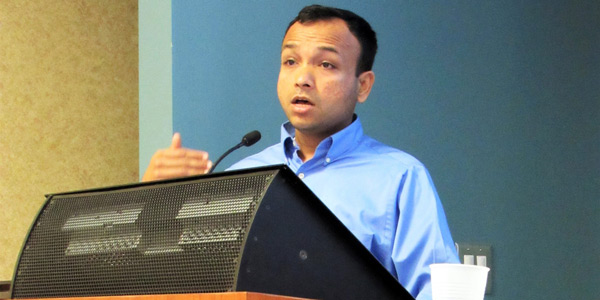By Amanda Durish Cook
MISO officials last week presented three proposals related to the implementation of the RTO’s new generator interconnection queue for stakeholder feedback.
The proposals — dealing with retaining interconnection rights, changing dispatch modeling and updating a study coordination agreement — are part of MISO’s effort to implement new interconnection rules approved by FERC in January (ER17-156). The new queue is intended to streamline a process that was plagued by restudies and backlogs. Last month, several stakeholders asked that some implementation details be fleshed out in discussions involving either the Planning Subcommittee or Planning Advisory Committee. (See MISO, Stakeholders Differ on New Queue Plan.)
MTEP Dispatch Modeling a Go

But planning manager Neil Shah told the PAC on Wednesday that MISO will immediately change the queue’s dispatch modeling to match its annual Transmission Expansion Plan. Before, generators in the queue were modeled based on their expected level of output; now they will be modeled based on their maximum requested interconnection service level. Stakeholders attending last month’s Interconnection Process Task Force had said the decision should not be made without soliciting stakeholder input during MISO planning committee meetings. (See MISO Adopts New Dispatch Model for Queue Studies.)
Shah said MISO sees a need for consistency between the MTEP dispatch modeling, which is used for baseline reliability studies, and the interconnection process.
Retaining Interconnection Rights
MISO is offering more flexibility on retention of interconnection rights. It is recommending that owners of retiring generation be allotted three years of continuing interconnection rights for replacement generation to begin commercial operations. However, some stakeholders said six years is a more realistic time period to allow generation to be built.
On Wednesday, stakeholders indicated that they would like MISO to allow for generator replacement instead of making owners of retiring generation re-enter the interconnection queue with their replacement plans. The RTO is considering executing a commercial agreement and conducting an out-of-cycle study with “reasonable study deposits” for such replacement scenarios.
Indianapolis Power and Light’s Lin Franks said MISO should check in with replacing generators to see what progress is being made before terminating rights at the end of an inflexible three-year deadline.
“Interconnection rights are not scarce in this footprint,” said Franks during an Aug. 15 Interconnection Process Task Force (IPTF) meeting. “If the rights are not scarce in the footprint ― and they’re not here ― it doesn’t make sense to put a definitive deadline on the project when they’re working through it.” She said although three years should usually be sufficient, she warned against the three-year deadline becoming an “unrealistic barrier to progress.”
“We still propose three years, but if at the end of the of that three-year period, the construction is still in progress, [MISO could allow] a three-year extension for commercial operations,” Shah said. He said MISO will consider the comments and bring back new queue implementation proposals in a few months.
Hwikwon Ham of the Minnesota Public Utilities Commission also pointed out that obtaining state approvals for generation construction can take time.
MISO will also allow generators to retain interconnection rights under an amended interconnection agreement when an owner upgrades equipment when it does not have a material impact on the grid.
New Study Coordination Agreement
MISO is also updating a coordination agreement with Manitoba Hydro and Minnkota Power Cooperative to improve the efficiency of generator interconnection studies under the revised queue. The agreement will be brought before the PAC in September.
Shah also repeated warnings about delays while MISO studies an unprecedented influx of queue projects under the definitive planning phase of the queue.
“It’s not set in stone. The timeline may change based on what we encounter,” Shah said.
Meanwhile, IPTF Chair Randy Oye said MISO PAC leadership is considering extending the life of the task force beyond its December sunset date, an extension approved by Steering Committee members late last month. If the IPTF is not extended beyond December, the IPTF and Steering Committee may have to assign unfinished queue issues to other MISO committees.




